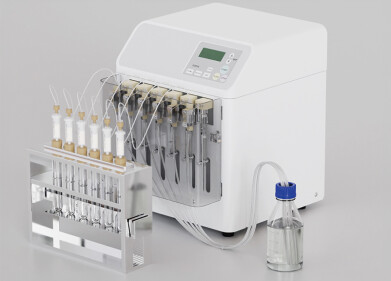-
 New therapy can treat pain and drug addiction, experts claim
New therapy can treat pain and drug addiction, experts claim
Solid phase extraction (SPE)
New therapy can treat pain and drug addiction, experts claim
Jan 14 2014
The development of a new type of drug could help to alleviate discomfort in people suffering from pain, and could also play a role in treating addictions, experts claim.
Scientists from the Florida campus of the Scripps Research Institute (TSRI) have identified a pair of drug candidates, which they say could advance the search for these two conditions, as well as other disorders.
The two new drug 'scaffolds', which were described in a recent edition of The Journal of Biological Chemistry, offer researchers novel tools that act on a demonstrated therapeutic target known as the kappa opioid receptor (KOR).
The experts noted that the KOR is located on nerve cells and plays a role in the release of the neurotransmitter dopamine and, while compounds that activate KOR are associated with positive therapeutic effects, they often also recruit a molecule known as Barrestin2 (beta arrestin), which is associated with depressed mood and severely limits any therapeutic possibilities.
Laura Bohn, a TSRI associate professor who led the study, said compounds that act as kappa receptors may provide a means for treating addiction and for treating pain; though there is potential for the development of depression or dysphoria associated with this receptor target.
She added: "There is evidence that the negative feelings caused by kappa receptor drugs may be, in part, due to receptor actions through proteins called beta arrestins.
"Developing compounds that activate the receptors without recruiting beta arrestin function may serve as a means to improve the therapeutic potential and limit side-effects."
These compounds are known as “biased agonists,” and activate the receptor without engaging the beta arrestins, explained research associate Lei Zhou, first author of the study with research associate Kimberly Lovell.
She explained: "The importance of these biased agonists is that we can manipulate the activation of one particular signaling cascade that produces analgesia, but not the other one that could lead to dysphoria or depression."
As the avoidance of depression is particularly important in addiction treatment, the research is so far very promising, especially as the two drug candidates have a high affinity and selectivity for KOR over other opioid receptors, as well as being able to pass through the blood-brain barrier.
Taking these attributes into consideration, the researchers now plan to continue developing the compound.
Events
Jan 20 2025 Amsterdam, Netherlands
Feb 03 2025 Dubai, UAE
Feb 05 2025 Guangzhou, China
Mar 01 2025 Boston, MA, USA
Mar 04 2025 Berlin, Germany












